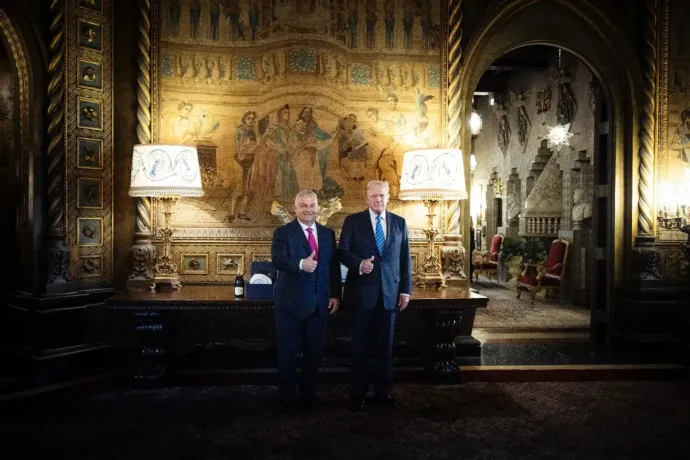We are praying for your victory! – Orbán's long road to getting close to Trump

"Viktor Orbán is a strong guy, a smart guy. He said that Trump is needed as president because China and North Korea were afraid of him. And so was Russia."
– this is how Donald Trump praised himself by praising the Hungarian Prime Minister in the only presidential debate of this year's American presidential election, the most important encounter he had with his challenger Kamala Harris of the Democratic Party. It is no coincidence that Trump brought up the leader of a small European country, since Orbán is one of the few incumbent presidents or prime ministers who has not only hinted at hoping for his victory, but has openly talked about it, and has also confirmed it in their regular meetings. The relationship between Orbán and Trump has visibly become stronger over the past four years.
Orbán first took the loyalty oath before Trump was elected in 2016. At the time, he took a big risk by being the first incumbent leader to endorse Donald Trump, who at the time seemed far from a front-runner for the presidency. Orbán's pick paid off in 2016, Trump became president, but there were no big thank yous at the time, and the first invitation did not arrive until 2018. Donald Trump only took the time to meet the Hungarian Prime Minister in Washington in the third year of his presidency: the leaders of twenty-two European countries preceded the Hungarian leader in the White House.
In view of this, it is not surprising that in 2020, Viktor Orbán again declared that he would be rooting for the re-election of the US President. It became clear already during the campaign that relations with Joe Biden's administration would not be smooth. Biden described Hungary as a totalitarian regime and compared it to Belarus. In the end, plan A did not work: Donald Trump failed to win again in 2020.
The Biden administration didn't even send an ambassador to Hungary for a year and a half, only to have the human rights activist and LGBTQ advocate lawyer David Pressman arrive in May 2022, a month after Fidesz won another two-thirds majority in the parliamentary elections. Since his posting, Pressman has been a regular critic of the Hungarian government, while they have regarded the US diplomat as an enemy, calling him a "press- man" and an "over-zealous fake diplomat".
So this time, Viktor Orbán had little to lose by backing Donald Trump for the third time.
The relationship between the Hungarian Prime Minister and Trump deepened after the former President lost the 2020 elections, especially since Orbán stood by him until the end. In 2021, Orbán proudly posted about a letter he had received from Trump congratulating him on his Fox News appearance. Granted, this was preceded by Orbán's letter supposedly confirming his support for Trump. In 2022, the former president rewarded Orbán's continued support by saying that he fully supported his re-election. In the fall of 2022, after his speech at CPAC in the United States, the Hungarian Prime Minister was received by Trump at his Bedminster estate. There, they celebrated Orbán's "great April victory" and talked about a strong America and peace. A few days later, Donald Trump officially announced that he would be running for president again.
In the meantime, the Hungarian Prime Minister repeatedly encouraged the former President to "keep fighting" and pledged his support for him. "Never give up," he wrote in a post when Trump was accused of taking top-secret documents home from the White House. Then, as the US campaign approached, praise started to arrive from Trump for Orbán, who is one of the few incumbent leaders to publicly support Trump. The former president even thanked Orbán for rooting for his return to the presidency. As time went on, the messaging between the "two great friends" became a regular occurrence: Trump said the Hungarians were lucky to have Viktor Orbán, and then called him a "strong-handed leader" in a speech – a phrase he repeated several times.
In the meantime, the Orbán administration also figured out how to incorporate its friendship with the former president into its own communications. With the Hungarian government once again staking everything on Donald Trump's victory, this year Orbán started talking about Trump being able to bring peace. For months, the Hungarian government has been saying that Trump alone is able to end the Russian-Ukrainian war that has plagued Europe for years. Orbán visited Washington again in March, but he did not meet with the current president, Joe Biden this time either. Donald Trump, however, received Orbán at a "friendly meeting" at his estate in Mar-a-Lago, where they referred to themselves as "peacemakers".
The Hungarian Prime Minister was even undeterred by the fact that Donald Trump had in the meantime been found guilty by a court of law in his hush-money trial. Orbán wrote that he had come to know Trump as an honest man and that he believed that it was the people, not the courts, who should pass judgment in the November elections. Donald Trump's name also came up in the Hungarian EP campaign, where Orbán referred to him as a peacemaker. The presidential candidate’s home was one of the stops of the Hungarian Prime Minister's "peace mission" in July, so the two met for the third time within a short period. This wasn't a bad thing for Trump either: an incumbent EU prime minister visited him during the increasingly heated US campaign to discuss, among other things, the state of the war between Russia and Ukraine.
While he was president, but also during the campaign, Trump talked a lot about how good he was at talking to foreign leaders. This allows him to project strength and to send the message that he is able to dominate foreign policy and suggest that he also commands respect abroad. It's therefore no coincidence that he met with Volodymyr Zelensky, for example, despite previously having criticized the Ukrainian president for his discussions with Kamala Harris.
Orbán and Trump's friendly messaging continued throughout the US presidential campaign: the former president sent his greetings to the Tusványos festival, and he brought up Orbán's name in the debate of the presidential candidates. The Hungarian Prime Minister has mentioned Donald Trump in numerous speeches, saying that he is "praying for his victory", and has even made Hungary's economic prospects dependent on his victory, including the way the budget for 2025 will be written. Five days before the election, he even made time for a phone call to Trump: 'I wished him good luck next Tuesday. Only five days to go. Let's keep our fingers crossed," Orbán wrote of their phone conversation.
One thing is for sure: if Trump wins the election, the relationship strengthened by face-to-face meetings could prove useful for Orbán in the years to come. The groundwork for this was laid by the fact that the Hungarian government and Trump's MAGA movement have been in close contact through several think tanks in recent years.
They haven't paid much attention to Harris
The Democrats have also mentioned Viktor Orbán's name, albeit with a rather negative connotation. When speaking at a campaign event before withdrawing from the race, Joe Biden said that the November election would be about democracy, and then scared voters by saying that Trump was meeting with "dictatorship builders" such as Viktor Orbán. In an interview afterwards, the President mentioned Putin and Orbán in the same context: he said that no leader besides Orbán and Putin believes that Trump should lead the United States.

At the end of July, the Democrats changed their presidential candidate, replacing Biden with Vice President Kamala Harris. The Orbán administration hasn't paid much attention to Kamala Harris and have continued to voice their support for Trump, the "messenger of peace" all along. The Hungarian government only commented on Harris' statements once during her short campaign.
Péter Szijjártó expressed his outrage after the Democratic Party's presidential candidate responded to a question in an interview about Donald Trump's good relations with politicians such as Viktor Orbán, Chinese President Xi Jinping and North Korean dictator Kim Jong-un. In response, Harris said that they were "dictators, authoritarians and people who have been well described as murderers". Szijjártó was subsequently questioned about the statement by the Russian news agency too, who interpreted Harris’ use of the adjective "murderer" as referring to all the names mentioned. "It's a scandal to talk about the Prime Minister like that. It is unacceptable. It is disrespectful not only to the Prime Minister, but also to the Hungarian people," the Hungarian Foreign Minister said at the time.
This approach has paid off several times before
It is not uncommon for Viktor Orbán to cultivate friendships with failed leaders or those who are less likely to be elected. He has several "fellow warriors" whom he has stood firmly by even after they were replaced, even if this has not necessarily been good for Hungary's diplomatic relations. The Hungarian Prime Minister was on good terms with the former Czech Prime Minister Andrej Babiš throughout his term in office, and he has continued to stand by his scandal-ridden colleague even after his departure. During this time, Babiš has visited Hungary several times, and their relationship has worked out well for Viktor Orbán, given that Babiš's party joined the Patriots for Europe EP group founded by Fidesz.
The former Czech prime minister is not the only one though. Viktor Orbán has also received the former Slovenian prime minister, Janez Janša at his office. In addition to supporting failed leaders, Orbán has also backed candidates who, like Trump, initially seemed less likely to win. This was the case, for example, with the Eurosceptic and anti-immigration politician Geert Wilders in the Netherlands, who won the most votes in last year's election. Wilders did not become Prime Minister, but his will has been largely asserted in the country.
The Hungarian PM has also long been friends with Marine Le Pen, the head of the French National Rally, who have also joined the Patriots for Europe group. Although he has not yet benefited from it, Orbán has also stayed in touch with the deposed Austrian chancellor Sebastian Kurz after he was forced out of office in 2021, following a scandal.
For more quick, accurate and impartial news from and about Hungary, subscribe to the Telex English newsletter!